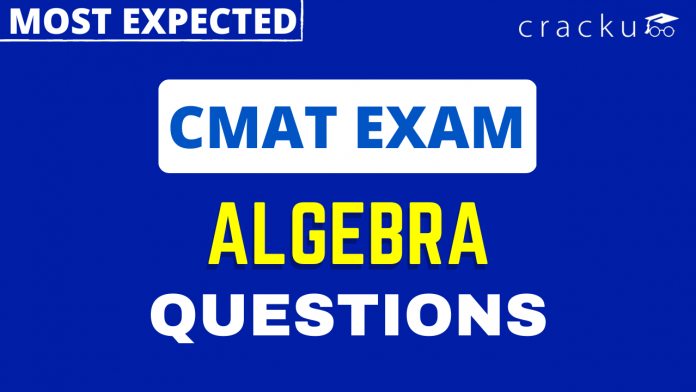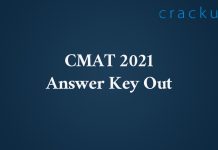CMAT Algebra Questions [Download PDF]
Download Algebra Questions for CMAT PDF – CMAT Algebra questions PDF by Cracku. Practice CMAT solved Algebra Questions paper tests, and these are the practice question to have a firm grasp on the Algebra topic in the XAT exam. Top 20 very Important Algebra Questions for XAT based on asked questions in previous exam papers. The CMAT question papers contain actual questions asked with answers and solutions.
Download Algebra Questions for CMAT
Enroll to CMAT 2023 Crash Course
Question 1: If $a=2b=8c$ and $a+b+c=13$ then the value of $\frac{\sqrt{a^{2}+b^{2}+c^{2}}}{2c}$ is:
a) $\frac{9}{2}$
b) $-\frac{5}{6}$
c) $-\frac{9}{2}$
d) $\frac{5}{6}$
1) Answer (A)
Solution:
$a+b+c=13$
Put the value of a and b,
8c + 4c + 8c = 13
c = 13/20
On put the value of a, b and c,
$\frac{\sqrt{(8c)^{2}+(4c)^{2}+c^{2}}}{2c}$
$\frac{\sqrt{81c^{2}}}{2c}$ = $\frac{9c}{2c}$ = $\frac{9}{2}$
Question 2: If x,y,z are three numbers such that $x+y=13,y+z=15$ and $z+x=16$, the
value of $\frac{xy+xz}{xyz}$ is:
a) $\frac{5}{36}$
b) $\frac{36}{5}$
c) $\frac{18}{5}$
d) $\frac{5}{18}$
2) Answer (D)
Solution:
x+y=13 —(1)
y+z=15 —(2)
z+x=16$ —(3)
By (1) + (2) + (3),
2(x + y + z) = 13 + 15 + 16
x + y + z = 44/2 = 22
put the value from eq(1),
13 + z = 22
z = 9
From eq(3),
9 + x =16
x = 7
From eq(3),
7 + y = 13
y = 6
Now,
$\frac{xy+xz}{xyz}$
= $\frac{(7)(6)+(7)(9)}{(7)(6)(9)}$
= $\frac{6 + 9}{6 \times 9}$
= $\frac{5}{18}$
Question 3: If $x – \frac{1}{x} = 11$, then $x^3 – \frac{1}{x^3}$ is:
a) 1474
b) 1364
c) 1188
d) 1298
3) Answer (D)
Solution:
$x – \frac{1}{x} = 11$
$x^3 – \frac{1}{x^3}$ = $(x – \frac{1}{x})^3 – 3(x – \frac{1}{x})$
($\because (a – b)^3 = a^3 – b^3 -3ab(a – b)$)
= $(11)^3 – 3(11)$
= 1331 – 33 = 1298
Question 4: The coefficient of $x^2$ in $(2x + y)^3$ is:
a) 8
b) $12 y^2$
c) $12 y$
d) 12
4) Answer (C)
Solution:
$(2x + y)^3$
= $(2x)^3 + y^3 + 3.2x.y(2x + y)$
($\because (a + b)^3 = a^3 + b^3 + 3ab(a + b)$)
= $8x^3 + y^3 + 6xy(2x + y)$
= $8x^3 + y^3 + 12x^2y + 6xy^2$
The coefficient of $x^2$ = 12y
Question 5: $(a + b + c – d)^2 – (a – b – c + d)^2 = ?$
a) $2a(b + c – d)$
b) $4a(b + c – d)$
c) $2a(b + c + d)$
d) $4a(b + c + d)$
5) Answer (B)
Solution:
$(a + b + c – d)^2 – (a – b – c + d)^2$
[(a + b + c – d)+(a – b – c + d)][(a + b + c – d) – (a – b – c + d)]
($\because a^2 – b^2 = (a + b)(a – b))$
= (2a)(2b + 2c – 2d)
= 4a(b + c – d)
Question 6: Expand: $(4a+3b+2c)^{2}$
a) $16a^{2}-9b^{2}+4c^{2}-24ab+12bc-16ca$
b) $16a^{2}+9b^{2}+4c^{2}+24ab+12bc+16ca$
c) $4a^{2}+3b^{2}+2c^{2}+24ab+12bc+16ca$
d) $16a^{2}+9b^{2}+4c^{2}-24ab-12bc-16ca$
6) Answer (B)
Solution:
$(4a+3b+2c)^{2}$
= $(4a)^2 + (3b)^2 + (2c)^2 + 2(4a.3b + 3b.2c + 2c.4a)$
($\because (a + b + c)^2 = a^2 + b^2 + c^2 + 2(a + b + c))$
= $16a^2 + 9b^2 + 4c^2 + 2(12ab + 6bc + 8ac)$
= $16a^2 + 9b^2 + 4c^2 + 24ab + 12bc + 16ac$
Question 7: $(3a-4b)^{3}$ is equal to:
a) $9a^{2}-16b^{2}$
b) $27a^{3}-64b^{3}-108a^{2}b+144ab^{2}$
c) $27a^{3}-64b^{3}$
d) $9a^{2}-24ab+16b^{2}$
7) Answer (B)
Solution:
$(3a-4b)^{3}$
= $(3a)^3 – (4b)^3 – 3(3a.4b)(3a-4b)$
($\because (a – b)^3 = a^3 – b^3 – 3ab(a – b)$)
= $27a^3 – 64b^3 – 36ab(3a-4b)$
= $27a^3 – 64b^3 – 108a^2b + 144ab^2$
Question 8: If $A+B=12$ and $AB=17$, What is the value of $A^{3}+B^{3}$ ?
a) 1116
b) 1166
c) 1106
d) 1213
8) Answer (A)
Solution:
$A^{3}+B^{3}$
= $(A + B)^3 -3AB(A+B)$
= $(12)^3 – 3 \times 17(12)$
= 1728 – 612 = 1116
Question 9: If $16a^4 + 36a^2b^2 + 81b^4 = 91$ and $4a^2 + 9b^2 – 6ab = 13$, then what is the value of $3ab$?
a) $\frac{3}{2}$
b) -3
c) $-\frac{3}{2}$
d) 5
9) Answer (C)
Solution:
$4a^2 + 9b^2 – 6ab = 13$
$(4a^2 + 9b^2 – 6ab)^2 = (13)^2$
$(\because(a + b + c)^2 = a^2 + b^2 + c^2 + 2(ab + bc + ac))$
$(4a^2)^2 + (9b^2)^2 + (6ab)^2 +2(4a^2.9b^2 – 9b^2.6ab – 6ab.4a^2) = 169$
$16a^4 + 36a^2b^2 + 81b^4 + 2(36a^2b^2 – 54ab^3 – 24a^3b) = 169$
$91 + 2(36a^2b^2 – 54ab^3 – 24a^3b) = 169$
$36a^2b^2 – 54ab^3 – 24a^3b = \frac{169 – 91}{2}$
$36a^2b^2 – 54ab^3 – 24a^3b = 39$
$6ab(6ab – 9b^2 – 4a^2) = 39$
$6ab(-13) = 39$
6ab = -3
3ab = -3/2
Question 10: If $P = \frac{x^3 + y^3}{(x – y)^2 + 3xy}, Q = \frac{(x + y)^2 – 3xy}{x^3 – y^3}$ and $R = \frac{(x + y)^2 + (x – y)^2}{x^2 – y^2}$, then what is the value of $(P \div Q) \times R$?
a) $2(x^2 + y^2)$
b) $x^2 + y^2$
c) $4xy$
d) $2xy$
10) Answer (A)
Solution:
$(P \div Q) \times R$
= $(\frac{x^3 + y^3}{(x – y)^2 + 3xy} \div \frac{(x + y)^2 – 3xy}{x^3 – y^3}) \times \frac{(x + y)^2 + (x – y)^2}{x^2 – y^2}$
= $\frac{x^3 + y^3}{(x – y)^2 + 3xy} \times \frac{x^3 – y^3}{(x + y)^2 – 3xy} \times \frac{(x + y)^2 + (x – y)^2}{x^2 – y^2}$
= $\frac{(x + y)(x^2 – xy + y^2)}{x^2 + y^2 – 2xy + 3xy} \times \frac{(x – y)(x^2 + xy + y^2)}{x^2 + y^2 + 2xy – 3xy} \times \frac{x^2 + y^2 + 2xy + x^2 + y^2 – 2xy}{(x + y)(x – y)}$
= $\frac{(x^2 – xy + y^2)}{x^2 + xy + y^2} \times \frac{(x^2 + xy + y^2)}{x^2 – xy + y^2} \times 2(x^2 + y^2) $
= $ 2(x^2 + y^2) $
Question 11: If $x^2 – 2\sqrt{5}x + 1 = 0$, then what is the value of $x^5 + \frac{1}{x^5}$?
a) $610\sqrt{5}$
b) $406\sqrt{5}$
c) $408\sqrt{5}$
d) $612\sqrt{5}$
11) Answer (A)
Solution:
$x^2 – 2\sqrt{5}x + 1 = 0$
Divide by x,
$x – 2\sqrt{5} + \frac{1}{x} = 0$
$x + \frac{1}{x} = 2\sqrt{5}$ —(1)
$(x + \frac{1}{x})^2 = (2\sqrt{5})^2$
$(x + \frac{1}{x})^2 = 20$
$x^2 + (\frac{1}{x})^2 + 2 = 20$
$x^2 + (\frac{1}{x})^2 = 18$ —-(2)
From eq(1),
$(x + \frac{1}{x})^3 = (2\sqrt{5})^3$
$x^3 + (\frac{1}{x})^3 + 3(x + \frac{1}{x}) = 40\sqrt{5}$
$x^3 + (\frac{1}{x})^3 = 40\sqrt{5} – 3(2\sqrt{5}) = 34\sqrt{5}$ —(3)
From eq(2) and (3),
$(x^2 + (\frac{1}{x})^2)(x^3 + (\frac{1}{x})^3) = (18)(34\sqrt{5})$
$(x^5 + \frac{1}{x} + x + (\frac{1}{x})^5) = 612\sqrt{5}$
$x^5 + \frac{1}{x^5} =612\sqrt{5} – 2\sqrt{5}$ = $610\sqrt{5}$
Question 12: If $2x^2 + y^2 + 8z^2 – 2\sqrt{2}xy + 4\sqrt{2}yz – 8zx = (Ax + y + Bz)^2,$ then the value of $(A^2 + B^2 – AB)$ is:
a) 16
b) 14
c) 6
d) 18
12) Answer (C)
Solution:
$2x^2 + y^2 + 8z^2 – 2\sqrt{2}xy + 4\sqrt{2}yz – 8zx = (Ax + y + Bz)^2$
= $2x^2 + y^2 + 8z^2 + 2(-\sqrt{2}xy – 2\sqrt{2}yz + 4zx) = (Ax + y + Bz)^2,$
= $2x^2 + y^2 + 8z^2 + 2(-\sqrt{2}x.y – y.2\sqrt{2}z + \sqrt{2}x.2\sqrt{2}z) = (Ax + y + Bz)^2$
= $(+\sqrt{2}x – y + 2\sqrt{2}z)^2 = (Ax + y + Bz)^2$
Ax = $\sqrt{2}x$
A = $\sqrt{2}$
y = -1
B = $2\sqrt{2}$
Now,
$(A^2 + B^2 – AB)$
$((\sqrt{2})^2 + (2\sqrt{2})^2 – \sqrt{2}.2\sqrt{2})$
= 2 + 8 – 4 = 6
Question 13: If $12x^2 – 21x + 1 = 0, $ then what is the value of $9x^2 + (16x^2)^{-1}$?
a) $\frac{429}{8}$
b) $\frac{465}{16}$
c) $\frac{417}{16}$
d) $\frac{453}{8}$
13) Answer (C)
Solution:
$12x^2 – 21x + 1 = 0 $
Divide by 4x,
$3x – 21/4 + 1/4x = 0 $
$3x + \frac{1}{4x} = \frac{21}{4}$
On taking square,
$(3x + \frac{1}{4x})^2 = (\frac{21}{4})^2$
$9x^2 + \frac{1}{16x^2} + 2.3x.\frac{1}{4x} = \frac{441}{16}$
$9x^2 + \frac{1}{16x^2} = \frac{441}{16} – \frac{3}{2}$
$9x^2 + \frac{1}{16x^2} = \frac{417}{16}$
Question 14: If x + y + z = 3, and $x^2 + y^2 + z^2 = 101$, then what is the value of $\sqrt{x^3 + y^3 + z^3 – 3xyz}$?
a) 19
b) 21
c) 24
d) 28
14) Answer (B)
Solution:
x³ + y³ + z³ – 3xyz = (x+y+z) [(x + y + z)² – 3(xy + yz + zx)] —(1)
And,
(x + y + z)² = x² + y² + z² + 2(xy + yz + zx)
On put the values,
$3^2 = 101 + 2(xy + yz + zx)$
(xy + yz + zx) = -92/2 = -46
From the eq(1),
x³ + y³ + z³ – 3xyz = (3) [(3)² – 3(-46)] = 3 $\times 147 = 441
$\sqrt{x^3 + y^3 + z^3 – 3xyz} = \sqrt{441}$ = 21
Question 15: If $x^2 – 3x + 1 = 0$, then what is the value of $x^6 + \frac{1}{x^6}$?
a) 324
b) 322
c) 318
d) 327
15) Answer (B)
Solution:
$x^2 – 3x + 1 = 0$
Divide both sides by x,
$x – 3 + \frac{1}{x} = 0$
$x + \frac{1}{x} = 3$
On taking both sides cube,
$(x + \frac{1}{x})^3 = 3^3$
$x^3 + \frac{1}{x^3} + 3(x + \frac{1}{x}) = 27$
$(\because (a + b)^3 = a^3 + b^3 + 3ab(a + b))$
$x^3 + \frac{1}{x^3} + 3(3) = 27$
$x^3 + \frac{1}{x^3} = 18$
on taking square both sides,
$(x^3 + \frac{1}{x^3})^2 = 18^2$
$x^6 + \frac{1}{x^6} + 2 = 324$
$(\because (a + b)^2 = a^2 + b^2 + 2ab)$
$x^6 + \frac{1}{x^6} = 322$
Question 16: If $x^4 + x^2y^2 + y^4 = 21$ and $x^2 + xy + y^2 = 7$, then the value of $\left(\frac{1}{x^2} + \frac{1}{y^2}\right)$ is:
a) $\frac{5}{2}$
b) $\frac{7}{4}$
c) $\frac{5}{4}$
d) $\frac{7}{3}$
16) Answer (C)
Solution:
$x^4 + x^2y^2 + y^4 = 21$
= $x^4 + x^2y^2 + y^4 + x^2y^2 – x^2y^2= 21$
= $x^4 + 2x^2y^2 + y^4 – x^2y^2= 21$
$(\because (a + b)^2 = a^2 + 2ab + b^2)$
= $(x^2 + y^2)^2 = 21 + x^2y^2$ —-(1)
$x^2 + xy + y^2 = 7$
$x^2 + y^2 = 7 – xy$ —(2)
From eq(1) and (2),
$(7 – xy)^2 = 21 + x^2y^2$
$49 + x^2y^2 – 14xy = 21 + x^2y^2$
14xy = 49 – 21
xy = 28/14 = 2
From eq(2),
$x^2 + y^2 = 7 – 2$
$x^2 + y^2 = 5$
Now,
$\left(\frac{1}{x^2} + \frac{1}{y^2}\right)$
= $\frac{x^2 + y^2}{x^2y^2}$
= $\frac{5}{2^2}$
= $\frac{5}{4}$
Question 17: The expression $(a + b – c)^3 + (a – b + c)^3 – 8a^3$is equal to:
a) $6a(a – b + c)(c – a – b)$
b) $3a(a + b – c)(a – b + c)$
c) $6a(a + b – c)(a – b + c)$
d) $3a(a – b + c)(c – a – b)$
17) Answer (A)
Solution:
Let $(a + b – c) = A$, $(a – b + c) = B$ and $2a^3$ = C
$(a + b – c)^3 + (a – b + c)^3 – 8a^3$
= $(A)^3 + (B)^3 – C^3$
$(a^3 + b^3 + c^3 = 3abc$ when a + b + c = 0)
So,
= -3ABC
=$ -3(a + b – c)(a – b + c).2a^3$
= $6a^3(a + b – c)(c – a – b)$
Question 18: If a + b + c = 11, ab + bc + ca = 3 and abc = —135, then what is the value of $a^3 + b^3 + c^3$?
a) 827
b) 929
c) 823
d) 925
18) Answer (A)
Solution:
$a^3 + b^3 + c^3$
= $(a + b + c)[(a + b + c)^2 – 3(ab + bc + ac)] + 3abc$
= $(11)[(11)^2 – 3(3)] + 3 \times (-135) $
= $(11)[112] – 405$
= 1132 – 405 = 827
Question 19: If $5x + \frac{1}{3x} = 4$, then whatis the value of $9x^2 + \frac{1}{25x^2}$?
a) $\frac{174}{125}$
b) $\frac{119}{25}$
c) $\frac{144}{125}$
d) $\frac{114}{25}$
19) Answer (D)
Solution:
$5x + \frac{1}{3x} = 4$
$\frac{3}{5}(5x + \frac{1}{3x}) = \frac{3}{5} \times 4$
$(3x + \frac{1}{5x}) = \frac{12}{5}$
On square both sides,
$(3x + \frac{1}{5x})^2 = (\frac{12}{5})^2$
$9x^2 + \frac{1}{25x^2} + 2.3x.\frac{1}{5x} = \frac{144}{25}$
$((a+b)^2 = a^2 + b^2 + 2ab)$
$9x^2 + \frac{1}{25x^2} = \frac{144}{25} – \frac{6}{5} = 0$
$9x^2 + \frac{1}{25x^2} = \frac{114}{25}$
Question 20: On simplification, $\frac{x^3 – y^3}{x[(x + y)^2 – 3xy]} \div \frac{y[(x – y)^2 + 3xy]}{x^3 + y^3} \times \frac{(x + y)^2 – (x – y)^2}{x^2 – y^2}$ is equal to:
a) 4
b) 1
c) $\frac{1}{2}$
d) $\frac{1}{4}$
20) Answer (A)
Solution:
$\frac{x^3 – y^3}{x[(x + y)^2 – 3xy]} \div \frac{y[(x – y)^2 + 3xy]}{x^3 + y^3} \times \frac{(x + y)^2 – (x – y)^2}{x^2 – y^2}$
= $\frac{x^3 – y^3}{x[(x + y)^2 – 3xy]} \times \frac{x^3 + y^3}{y[(x – y)^2 + 3xy]} \times \frac{(x + y)^2 – (x – y)^2}{x^2 – y^2}$
= $\frac{(x – y)(x^2 + xy + y^2)}{x[(x + y)^2 – 3xy]} \times \frac{(x + y)(x^2 – xy + y^2)}{y[(x – y)^2 + 3xy]} \times \frac{(x^2 + y^2 + 2xy) – (x^2 + y^2 – 2xy)}{(x + y)(x – y)}$
= $\frac{x^2 + xy + y^2}{x[x^2 – xy + y^2]} \times \frac{x^2 – xy + y^2}{y[x^2 + xy + y^2]} \times 4xy$ = 4





